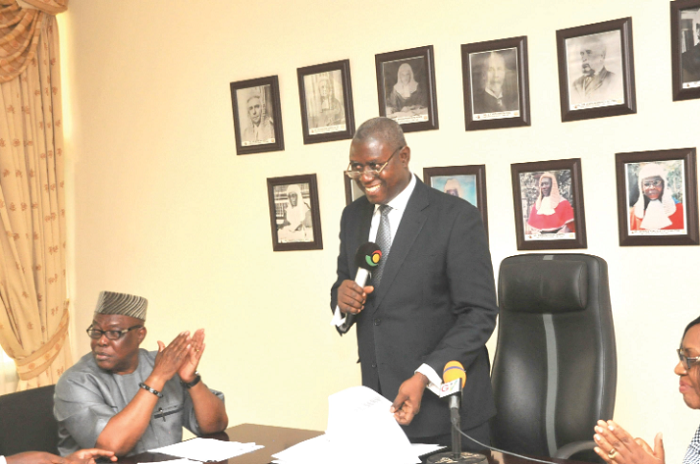
Four new members of NMC inducted
Four new members of the National Media Commission (NMC) have been inducted into office, with a call on them to join hands with their colleagues to push for the passage of the Broadcasting and the Right to Information bills into law.
Advertisement
Those inducted were Mr Yaw Boadu-Ayeboafoh, the Director of Newspapers at the Graphic Communications Group Limited, and Mr Kenneth Agyei Kuranchie, the Editor of the Searchlight newspaper, representing the Office of the President on the commission.
The rest were Mr Yaw Buabeng Asamoah, the Member of Parliament (MP) for Adenta, representing the Majority in Parliament, and Prof. Audrey Gadzekpo, a communications consultant and lecturer at the School of Communication Studies of the University of Ghana, who represents women’s groups.
A fifth member, Mr Kwame Anyimadu-Antwi, the MP for Asante Akyem South, who is one of the members representing the Majority in Parliament, was not present to be sworn into office.
The new representatives now complete the 18-member commission.
Charge
Administering the oath of allegiance and the official oath to the new members, a Justice of the Supreme Court, Mr Justice Anin Yeboah, told them that their success or otherwise would be determined by their performance as regulators of the media industry.
“You must not let the nation down at this critical stage of its development,” he charged them.
He said they were joining the NMC at a time when the media space was expanding exponentially, with its attendant challenges, and noted that the migration from analogue to digital television, in particular, had triggered an “unprecedented explosion of TV channels” and prompted an effective content monitoring more than ever before.
“The dumping of telenovelas and the decline in standards on our screens deserve urgent attention,” he noted.
Unrestrained content
Another issue of grave concern that Justice Yeboah raised had to do with the unrestrained advertisement of alcoholic drinks and products, backed by sexually explicit pictures and messages in the media which, he said, had dire consequences for the moral fibre of the youth.

In that light, he said Article 164 of the Constitution, which imposes national security, national morality and public order restrictions on the media, begged for strict enforcement and expressed the hope that the passage of the Broadcasting Bill into law would strengthen content monitoring and regulation.
He alluded to the attempt by the NMC to assume more regulatory powers which the Supreme Court disallowed and said that should not hinder the commission from diligently enforcing the regulatory powers it was already clothed with to inject sanity and decency in sections of the media.
NMC Chairman
Earlier, the Chairman of the NMC, Nana Kwasi Gyan Apenteng, had said the Commission was currently confronted with what he described as the ‘teeth question’, for which reason many had accused it of not being able to bite as expected.
He stated that those concerns captured two essential elements of media regulation in democratic governance and touched on the Broadcasting and the Right to Information bills which, he said, were in limbo to empower the NMC with the teeth to bite.
Poor working conditions
Nana Apenteng decried the state of the NMC in terms of being the poorest institution created by the 1992 Constitution.
He said it had no permanent office and only a fraction of its budget allocation was often provided, adding that allowances for members were usually several months in arrears, while the salaries of staff needed urgent review.
“We need to emphasise that effective media regulation is an important prerequisite for the enjoyment of free expression and its deployment as a tool of development, transparency and social justice,” he said.
Nana Apenteng said effective, fair and equitable media regulation did not threaten freedoms but that the absence of a well-structured regime of regulation rather posed the threat of undermining the freedom and independence of the media.
On that score, he appealed to the government to prioritise the passage of the Broadcasting and the Freedom of Information bills and other subsidiary laws and regulations that were needed to ensure the enjoyment of media freedom.
Prof. Gadzekpo, on behalf of her colleagues, affirmed their commitment to live up to expectation.
